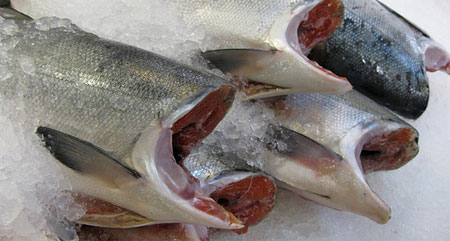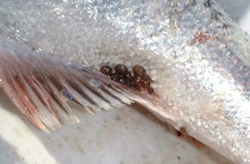
Salmon researchers are not a bunch of tweed-clad academics politely arguing over a cup of tea. Think sailors engaged in a bar fight instead.
The scientists who study wild salmon populations are locked in a fierce debate over salmon farms, the sea lice that thrive in them, and the destructive effect of those sea lice on wild salmon. Are the farms a threat? How much of a threat compared to other threats, such as logging and climate change?
Counting fish in a big ocean is hard work. It’s not easy to track wild salmon, and it’s even harder to isolate the causes of a decline in population once you have established that a population is in decline. The difficulties inherent in salmon research allow bias to creep in. There’s plenty of acrimony and the gray areas create an atmosphere of doubt that generally strengthens the status quo, i.e., current salmon farming practices.
Yesterday I ran across an article (Science, Scientists and Salmon Farming) recently published in the Courier-Islander here in British Columbia about how the messiness of the scientific process helps those who have a financial interest in avoiding inconvenient and expensive truths. It got me thinking. Just as creationists love to willfully misunderstand the term, “theory,” when talking about the theory of evolution, global-warming deniers and the salmon-farming industry alike have become convenient champions of the refinable nature of science. The research is inconclusive, they say. Doubt still hangs in the air, goes the refrain.
It’s an ugly kettle of fish for journalists and bloggers, who have to try to evaluate claims based on articles published in scientific journals–highly technical articles larded with weird jargon. Who’s right, and how do you sort out all the messy research? The haggling over scientific reports goes on and not much changes.
But why, I wonder, wasn’t the burden of proof placed on the salmon farming industry in the first place? That is to say, in a truly conservative regulatory environment, maybe salmon farms should have been licensed only on the condition that they continue to prove every year that they are doing no harm to the far more valuable wild fish stocks. Instead, it seems as though all the salmon farming industry has to do to keep things more or less as they are is to keep on sprinkling doubt on a bewildered public.

Sea Lice
Maybe the burden of proof should be on the aquaculture industry, but, of course, that’s not the way the system works. Not by a long shot. Instead, we have the very unconservative, brave new world of aquaculture innovation, a lesser cousin of the radical financial innovation that conservatives were so confident would not wreck the world economy. It’s hard to avoid seeing that some conservatives are only conservative when it’s profitable. Maybe instead we ought to embrace real conservatism and go about conserving this tremendously important natural resource as carefully and cautiously as we know how, a resource that has been feeding British Columbians and holding together the food chain for thousands of years.
The argument of the article in the Courier-Islander is that the leading researchers have democratically come to a consensus, despite the challenges involved: the salmon farms are a threat to wild salmon. For consumers that means that if you like having wild salmon around, you should probably not buy farmed. You might choose to hold off on wild, as well, if that isn’t too much of a hardship. Personally, I love the stuff and not eating it is a hardship for me. As far as I know, the only truly flourishing West Coast salmon fishery is in Alaska, but you know, if you buy fresh Alaskan salmon, you’re paying to have that fresh fish put on a plane and flown down to Vancouver. Extravagant and not very green.
You can’t win. You can’t do much except daydream about the good old days, when you could practically walk across the backs of the millions of salmon in the Fraser River to the other side, when they used to trap a thousand fish at one cast of the net, and throw back everything but the sockeye as bycatch. Those days are long gone.
So Long and Thanks For All the Fish « Conscious Cook said
[…] government bureaucrats, and various interested groups such as salmon farmers and fishermen, have been squabbling over conservation/exploitation issues for years. The usual […]